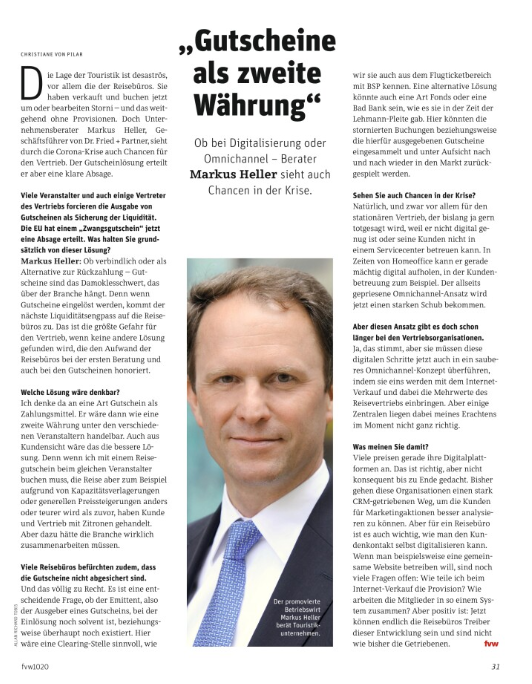Vouchers as a second currency – Dr. Markus Heller in an interview with fvw

Vouchers as a second currency – Dr. Markus Heller in an interview with fvw
12.05.2020
The situation of tourism is disastrous, especially that of travel agencies. They have sold and are now rebooking or processing cancellations – and largely without commission. But management consultant Dr. Markus Heller, managing partner of Dr. Fried & Partner, also sees opportunities for sales through the corona crisis. However, he clearly rejects the voucher solution.
Many tour operators and also some sales representatives are pushing the issue of vouchers as a means of securing liquidity. The EU has now rejected a “forced voucher”. What is your basic opinion of this solution?
Markus Heller: Whether binding or as an alternative to repayment – vouchers are the sword of Damocles hanging over the industry. I say that quite clearly. After all, when vouchers are redeemed, the next liquidity bottleneck will come to the travel agencies. That is the greatest danger for sales if no other solution is found that rewards the travel agencies’ efforts in both the initial consultation and the redemption of vouchers.
Which solution would be conceivable?
I am thinking of a kind of voucher as a means of payment. It would then be tradable like a second currency among the various tour operators. This would also be the better solution from the customer’s point of view. Because if I have to book a travel voucher with the same tour operator, but the trip is different or more expensive than before, for example due to capacity shifts or general price increases, the customer and sales department would have traded with lemons. But for this to happen, the industry really would have had to work together.
Many travel agencies also fear that the vouchers are not secured.
And quite rightly so. It is a crucial question whether the issuer of the voucher is still solvent or still exists when the voucher is redeemed. In this case, a clearing house would make sense, as we know it from the air ticket sector with BSP. An alternative solution could also be a kind of fund or bad bank, as was the case during the time of the Lehmann bankruptcy. Here the cancelled bookings or the vouchers issued for them could be collected and gradually returned to the market under supervision.
Do you also see opportunities in the crisis?
Of course, especially for stationary sales, which up to now has been pronounced dead because it is not digital enough or cannot look after its customers in a service centre. In times of the home office, they are currently catching up with the digital world, for example in customer service. The widely praised omnichannel approach will now receive a strong boost.
But this approach has been around in the sales organizations for quite some time.
Yes, that’s true, but they now have to transform these digital steps into a clean omnichannel concept by becoming one with Internet sales and adding the added value of travel sales. But I think that some central offices are not quite right at the moment.
What do you mean by that?
Many are currently promoting their digital platforms. That’s right, but it’s not thought through to the end. So far, these organizations are taking a strongly CRM-driven approach to better analyze customers for marketing campaigns. But for a travel agency, it is also important how to digitalize the customer contact itself. And if you want to operate a joint website, for example, there are still many questions unanswered: How do I share the commission for an Internet sale? How do the members work together in such a system? But on the positive side: Now travel agencies can finally be the drivers of this development and are not the driven ones as before.
The interview was published on May 8, 2020 in e-Paper and the print edition 10/2020 of the industry trade journal fvw

